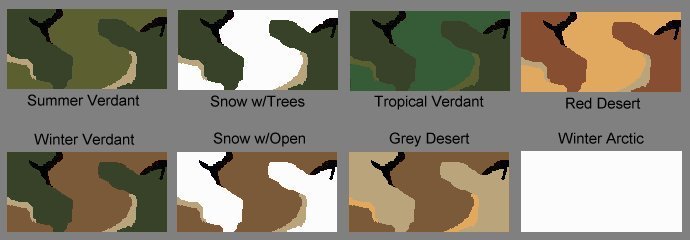In the 1970's the US Army developed a vehicle camouflage system which has since become known by modelers as MERDEC camouflage. The MERDEC camouflage replaced the overall Olive Drab color scheme used by the US Army from the end of World War II and was used on most vehicles beginning about 1977 and then later replaced by the current Green, Brown and Black NATO camouflage scheme. US Army Technical Bulletin TB 43-0209 (1976) was published to illustrate the standardized MERDEC camouflage patterns for most Army vehicles including tanks and APC's. Even though official MERDEC patterns were published, vehicles were at times painted without following the official patterns. The US Army intended to provide a camouflage system which could be adapted to different environments by making changes to one or two colors on the vehicle and thus easing the burden on the painters when a unit deployed to different environments. There were eight MERDEC color schemes. These were composed of four colors except for the Winter Arctic scheme which was solid White. Two of the four colors were major colors and each covered 45% of the vehicle with broad wavy swaths of color. The other two colors were usually Sand and Black and each covered 5% of the vehicle in narrow irregular branching bands of color. After the MERDEC scheme was adopted, most newly manufactured vehicles were painted overall Forest Green and the camouflage schemes were then completed by the unit receiving the vehicle. Camouflage patterns were outlined on the vehicles with chalk and then the paints were sprayed or brushed onto the vehicle, so the MERDEC schemes can be modeled with either soft or hard edges between colors. A combination of hard and soft edges is also possible especially if the major colors are sprayed and the minor colors brushed on. The US Army had 12 different camouflage paint colors in inventory when the MERDEC scheme was introduced. The MERDEC camouflages used 9 of those colors. Desert Sand, Olive Drab and Earth Brown were the colors not used in the MERDEC schemes, however there may have been instances were those colors were used. The table below shows the color name and abbreviation, approximate color, and FS 595 number of the paints in US Army inventory when the MERDEC system was adopted. Many of the colors are currently available from model paint manufacturers. The colors will appear differently depending on how your computer monitor is adjusted, so the colors are only approximations.
The table below shows the eight camouflage color schemes used in the MERDEC schemes. Each scheme was chosen according to the expected operating environment for the vehicles. The most commonly used schemes were the Winter Verdant, Summer Verdant, and the Grey Desert schemes.
The eight MERDEC schemes are illustrated below. Note that many of the schemes are only one paint color different than another scheme. The colors reflect newly applied paints without any scale effects and are darker than what might be chosen for a model.
Additional Resources: U.S. General Services Administration, Federal Standard No. 595a Colors, 1979, Washington D.C. George Bradford, "Armor Camouflage & Markings", AFV News , Internet http://www.activevr.com/afv/camouflage/m113a1.html U. S. Dept. of the Army. Technical Bulletin Number 43-0209, pp53ff. Washington D.C.: Headquarters, Oct. 1976. Washington, D.C. |
|||||||||||||||||||||||||||||||||||||||||||||||||||||||||||||||||||||||||||||||||||||||||||||||||
